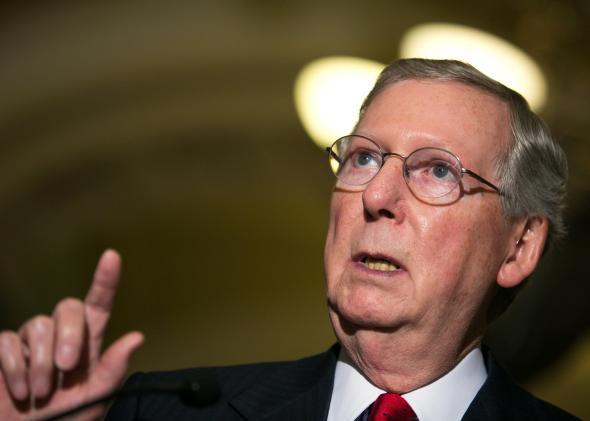One of the great ironies of the Obama administration is that—on several occasions—it was pushed to the left by Republicans. The Affordable Care Act didn’t have to have the Medicaid expansion—a huge liberal reform of a major government program. It didn’t have to have the generous subsidies, the “cadillac tax” on expensive, high-income insurance plans, or the broad coverage for birth control and other contraceptives. At any point during the health care debate—which lasted from the spring of 2009 to the beginning of 2010—Republicans could have bargained with Democrats to remove or weaken those provisions for their support on the final bill. And the White House would have gone along. The president wanted bipartisan support, and with his post-partisan faith still strong, he would have sacrificed a lot to get it.
But Republicans refused. Instead, they fought a war, attacking reform, denying their participation—and in the process—marking the right of the Democratic Party as the conservative boundary of discussion over the bill. It’s why, after President Obama finally signed the Affordable Care Act into law, former Bush speechwriter David Frum called the occasion “the most crushing legislative defeat” for Republicans since the 1960s. “Barack Obama badly wanted Republican votes for his plan. Could we have leveraged his desire to align the plan more closely with conservative views,” asked Frum, “To finance it without redistributive taxes on productive enterprise—without weighing so heavily on small business—without expanding Medicaid? Too late now. They are all the law.”
This dynamic—Republicans losing their shot for more conservative policy at the cost of some cooperation—played out with entitlement reform (a small concession on taxes would have won a “grand bargain” on Medicare and Social Security), and environmental policy (instead of a market-based “cap and trade,” Republicans will get new regulations and a more bureaucratic approach). And now it is about to play out with immigration, too.
Last week, administration officials leaked the president’s plan to overhaul the nation’s immigration system through executive fiat. President Obama, writes the New York Times, “intends to order changes that will significantly refocus the activities of the government’s 12,000 immigration agents.” The most important part of the order is a change that gives protection to millions of unauthorized immigrants, allowing “many parents of children who are American citizens or legal residents to obtain legal work documents and no longer worry about being discovered, separated from their families and sent away.” In addition, new protections could include unauthorized immigrants who came to the United States as children—the “DREAMers”—as well as agricultural workers who entered the country illegally but have spent years in farms and factories.
According to an analysis from the Migration Policy Institute, this plan—which might build on the Deferred Action for Childhood Arrivals program—could reach more than 5 million people, depending on the exact criteria the administration applies. Compared to the Senate immigration bill passed last year—or the guidelines crafted by House Republicans the same year—the White House plan is less far reaching. At the same time, it lacks the border security and enforcement mechanisms of the bipartisan and Republican proposals. Under the president’s plan, millions of immigrants will receive legal protection without any of the requirements of the bipartisan Senate bill, from thousands of new border and customs agents, to billions of dollars in new enforcement funding, to strict triggers for when unauthorized immigrants are even eligible to apply for legal status and citizenship. Liberals will have made an important policy advance—and one likely to stick, judging by similar executive orders by previous presidents—without making substantive concessions to conservative priorities.
I wouldn’t call it a defeat on the same scale of the Affordable Care Act, but it is a defeat. Democrats weren’t going to relent on immigration. Latinos are an important part of the Democratic coalition and key to the party’s effort to change the partisan dynamic in states like North Carolina, Georgia, Texas, and Arizona. And while Latino disappointment wasn’t determinative in this year’s elections, it’s dangerous for Democrats to delay action through 2016, both on the merits—there’s no guarantee of immigration reform in 2017—and on the politics; absent action on immigration, Latinos might just sit out the presidential election, dealing a blow to Democrats in key states like Florida, Colorado, and Nevada. (To that point, it’s no surprise that lawmakers from the latter two have urged Obama to move with executive action on immigration.)
Given the high priority for immigration reform, there’s no question Democrats could have worked with House Republicans to craft a counterpart to the Senate bill. And indeed, there’s a good chance they would have made even more concessions if it guaranteed a vote. As with health care, Republicans could have gotten more conservative policy than they otherwise will if they had backed down from their relentless opposition.
Now, the obvious reply to this is that the president’s executive action is lawless—that it’s outside of the bounds of presidential power. And if that’s true, then it’s hard to pin the outcome on Republicans; unlike health care—where Democrats really could act regardless of what Republicans did—immigration legislation is only possible with GOP cooperation. In normal circumstances, the president backs down when he loses a legislative fight. If, instead, he responds with an illegal executive order, then it’s unfair to point the finger at the opposition and say, you did this.
But, GOP assertions aside, there’s no evidence the president’s plan is illegal. Could it create a bad precedent for the exercise of executive authority? Yes. Is it, like Ross Douthat argues for the New York Times, a little hypocritical? Probably. But does it go beyond the president’s constitutional authority? Not at all.
Which is to say that, when it comes to the prospect of a new, more liberal immigration regime, Republicans have themselves to blame. With a few concessions, they could have gotten more enforcement and tighter security. Instead, we’ll have legal status for millions of immigrants, with few Republican fingerprints.
